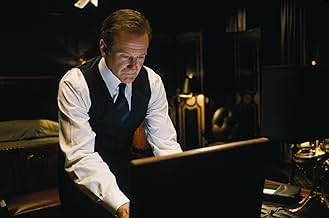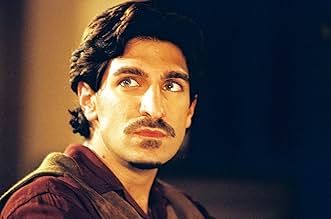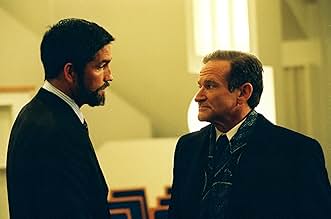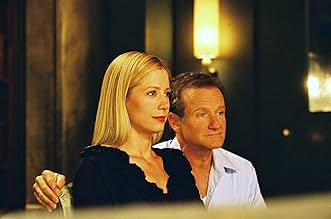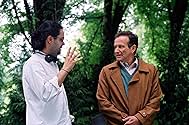VALUTAZIONE IMDb
6,1/10
35.429
LA TUA VALUTAZIONE
In un mondo con impianti per la registrazione della memoria, Alan Hakman lavora come un editore, qualcuno con il potere di modifica finale sulle storie registrate delle persone. Il suo ultim... Leggi tuttoIn un mondo con impianti per la registrazione della memoria, Alan Hakman lavora come un editore, qualcuno con il potere di modifica finale sulle storie registrate delle persone. Il suo ultimo incarico è quello che lo mette in pericolo.In un mondo con impianti per la registrazione della memoria, Alan Hakman lavora come un editore, qualcuno con il potere di modifica finale sulle storie registrate delle persone. Il suo ultimo incarico è quello che lo mette in pericolo.
- Regia
- Sceneggiatura
- Star
- Premi
- 1 vittoria e 4 candidature totali
Tarek Bishara
- Hasan
- (as Thom Bishops)
Recensioni in evidenza
Well, I just saw The Final Cut over the weekend and I am finding myself very disappointed in the movie. From the previews I had imagined something a little different with a lot more action that what took place. There were certain scenes that I felt were good and like them, but all in all I would rather have waited to just rent the movie than to have gone to see it in the theaters. It was a pretty slow moving movie when I was expecting more suspense and action. Robin Williams did a great job in the part, just to clarify. Once again, it was just my view of the movie as a whole that I did not like. The overall plot was good and the storyline had a great theme but as I watched, I just became more and more disappointed. Then at the end, it just kind of ended. To me, I was left with the feeling that there should have been more than just a sudden ending like it had.
Set during an unspecified future era, or perhaps an "alternate universe" present era, The Final Cut posits a world in which "first person viewpoint" computer chip implants are possible for those who can afford it. These record a person's entire life from a first person viewpoint--the "camera" sees what the person sees, hears what they hear. The intention is to have an accurate, documentary-like record after the person dies. These are presented as films at their funerals. Citizens known as "cutters" (just a slang for a film editor) pare down one's life to a feature length presentation. There are also those who protest the implants. The Final Cut is the story of the latter days of a cutter, Alan W. Hakman (Robin Williams).
While The Final Cut is enjoyable enough, it has tremendous squandered potential. As one would expect, Williams turns in an incredible performance, but the script, by writer/director Omar Naim, could have used a lot of work.
The premise is fabulous. It opens many philosophical and psychological cans of worms. Some are dealt with, but only cursorily. Surely cutters go through a lot of emotional trauma as they vicariously experience the lows and the mundanities of other person's lives. Naim shows us this briefly with a recording of someone who was an abuser. But as soon as he shows us this material, he drops it. The film is advertised as a thriller. How much more exciting would it have been to embed Hakman in the middle of some grand, suspenseful plot, the details of which became known to him through data from an implant? As one of the opponents of the implant technology remarks, the implants have changed the way people relate to each other. That is a good point--it would have a profound impact on that. So why aren't we shown instances of this in the film? This could have been another hinge for a very intriguing, tense plot.
There are also issues of invasion of privacy, surveillance paranoia, consent (the implants are shown being put into infants and being permanent), and "misuse" of the data. Most of these are barely touched. Often they're only broached with a single comment, or a protester's sign.
Other fascinating issues brought up by the idea of the technology are not even mentioned. Surely, such technology would prove to be invaluable as evidence in crimes. And surely many people, especially victims, would voluntarily offer a "tap" into their implants so they can be witnesses. Why not comment on these kinds of possibilities? The Final Cut is also oddly understated with such a far-reaching sci-fi premise in this era of rubber reality films. A number of plot points, such as the one involving Louis Hunt, have almost disappointingly mundane resolutions. For that matter, for a sci-fi film set in the future or an alternate reality, there isn't much that is different about the world except for the implants. Probably the lack of differences was due to budget. It costs a lot of money to build alternate realities.
This might sound far too negative for the film to warrant a 7 out of 10 from me, which is equivalent to a "C" letter grade. Much of the film is saved by the performances. In combination with direction that is more often than not interesting and unusual, it's easy to focus on the promise of the premise rather than the unfulfilled extensions of the same.
Hakman, and presumably the other cutters, have odd dispositions. Their task is to make everyone look good--like a mortician making up a mangled body so it's "presentable" at a funeral. They spend hour upon hour as voyeurs. They are something like archivists, but also have to play detective. It makes them strangely aloof and dour. It's difficult for them to have relationships. Naim gets in a couple cracks that portray the cutters and their social relationships as similar to geeky "Internet addicts". This is all good stuff, and it's excellently played by Williams.
The flow of the film is a bit odd, and especially the ending (which I praised for its relative nihilism) is eventually abrupt in a way that doesn't exactly work (and I usually love abrupt endings). Being generous, we could take the wonky flow as a "level-removed" kind of self-reference. Of course Naim was faced with cutting the film to make it look good, but it's a bit awkward and arbitrary-feeling, just as a cutter's work would likely be when faced with having to produce a coherent 90-minute film out of 80 years' worth of material. Being less generous, Naim simply needs to learn how to better tell a story, and there was no intention of real-world reflexivity with his fictional material.
The Final Cut is worth seeing, especially if you're a Robin Williams fan as I am, but it's a disappointment considering what it could have been.
While The Final Cut is enjoyable enough, it has tremendous squandered potential. As one would expect, Williams turns in an incredible performance, but the script, by writer/director Omar Naim, could have used a lot of work.
The premise is fabulous. It opens many philosophical and psychological cans of worms. Some are dealt with, but only cursorily. Surely cutters go through a lot of emotional trauma as they vicariously experience the lows and the mundanities of other person's lives. Naim shows us this briefly with a recording of someone who was an abuser. But as soon as he shows us this material, he drops it. The film is advertised as a thriller. How much more exciting would it have been to embed Hakman in the middle of some grand, suspenseful plot, the details of which became known to him through data from an implant? As one of the opponents of the implant technology remarks, the implants have changed the way people relate to each other. That is a good point--it would have a profound impact on that. So why aren't we shown instances of this in the film? This could have been another hinge for a very intriguing, tense plot.
There are also issues of invasion of privacy, surveillance paranoia, consent (the implants are shown being put into infants and being permanent), and "misuse" of the data. Most of these are barely touched. Often they're only broached with a single comment, or a protester's sign.
Other fascinating issues brought up by the idea of the technology are not even mentioned. Surely, such technology would prove to be invaluable as evidence in crimes. And surely many people, especially victims, would voluntarily offer a "tap" into their implants so they can be witnesses. Why not comment on these kinds of possibilities? The Final Cut is also oddly understated with such a far-reaching sci-fi premise in this era of rubber reality films. A number of plot points, such as the one involving Louis Hunt, have almost disappointingly mundane resolutions. For that matter, for a sci-fi film set in the future or an alternate reality, there isn't much that is different about the world except for the implants. Probably the lack of differences was due to budget. It costs a lot of money to build alternate realities.
This might sound far too negative for the film to warrant a 7 out of 10 from me, which is equivalent to a "C" letter grade. Much of the film is saved by the performances. In combination with direction that is more often than not interesting and unusual, it's easy to focus on the promise of the premise rather than the unfulfilled extensions of the same.
Hakman, and presumably the other cutters, have odd dispositions. Their task is to make everyone look good--like a mortician making up a mangled body so it's "presentable" at a funeral. They spend hour upon hour as voyeurs. They are something like archivists, but also have to play detective. It makes them strangely aloof and dour. It's difficult for them to have relationships. Naim gets in a couple cracks that portray the cutters and their social relationships as similar to geeky "Internet addicts". This is all good stuff, and it's excellently played by Williams.
The flow of the film is a bit odd, and especially the ending (which I praised for its relative nihilism) is eventually abrupt in a way that doesn't exactly work (and I usually love abrupt endings). Being generous, we could take the wonky flow as a "level-removed" kind of self-reference. Of course Naim was faced with cutting the film to make it look good, but it's a bit awkward and arbitrary-feeling, just as a cutter's work would likely be when faced with having to produce a coherent 90-minute film out of 80 years' worth of material. Being less generous, Naim simply needs to learn how to better tell a story, and there was no intention of real-world reflexivity with his fictional material.
The Final Cut is worth seeing, especially if you're a Robin Williams fan as I am, but it's a disappointment considering what it could have been.
I really enjoyed Robin Williams performance in this movie. Mira Sorvino was also pretty good. what an interesting idea this movie does present us. what if.... and the end of you're life someone could take out all of the bad things you did or thought about.. and have someone re-arrange all of you're memories to where only the pleasant stuff came to surface,, therefore when people went to you're funeral you would be fondly remembered. well this is the job that is set for our main character to accomplish,, this time he has to make over a nasty lawyer's life,, and there is something that he has seen that he shouldn't have and therefore his life is threatened and his life is now in danger. Robin Williams recently has played a few bad guys, and a few creepy ones.. it's a refreshing turn for me as only ever seen him in comedies.. and his stand-up, and the ever popular Mork and Mindy on TV. this is a dark movie, and very well done,, I will watch it again soon.
I don't completely understand the negative reviews of this film because I thought films (except for documentaries) legitimately use the "willfull suspension of disbelief" to accomplish their goals of entertainment. Granted, not everything in this film makes perfect logical sense and could have been written just a little better (or maybe suffers the fate of all literature to film shortcomings) but I absorbed the film as a morality/ethics dilemma rather than a logical tale of facts and relationships. I do concede the ending left me a little wanting for resolution.
Good questions were touched upon in a less than preachy head slap because of the low key acting presentations. And Williams has always held my attention in any of his work to date. This one is worth watching if you're not a detail critic, though it's not as badly crafted as some would make it seem.
Good questions were touched upon in a less than preachy head slap because of the low key acting presentations. And Williams has always held my attention in any of his work to date. This one is worth watching if you're not a detail critic, though it's not as badly crafted as some would make it seem.
"The Final Cut" is a dark cross between "Eternal Sunshine of the Spotless Mind", "One-Hour Photo" and "Citizen Kane."
While this is an original screenplay by writer/director Omar Naim, it is faithful to a Philip Dick-type imagining of a techno-world in the not-so-distant future, with the bleakness, of both the excellent production design, cinematography, music and the story, only briefly mitigated.
I like how gradually we see the explanations and issues of memories from many different view points and issues, while one lives and dreams and how one lives on in other people's memories, as a multiplier effect in touching other people and our own souls.
Just as the interviews of family recall the journalist trying to understand Kane, the fine scene is a nice visual play on his famous mystifying "Rosebud," ironically demonstrating that someone outside one's head can never understand what is significant and meaningful to an individual, what goes into making that unique personality.
While I'm not sure it's such a bombshell that eulogies --in this case as visually edited "re-memories" culled from brain implants--are whitewashes (as pointedly satirized by Tom Wolfe in "Bonfire of the Vanities") and the political protesters seemed almost to be satirically out of a T. C. Boyle novel, James Caviezel's seriousness keeps them out of Unabomber territory.
One awkward miscast is Mira Sorvino. As if it's not already obvious why a Robin Williams would be attracted to a blonde bombshell, another layer of motivation is added, but it just makes absolutely no sense why she was drawn to him. Not only does this seem yet another instance of film's older man/younger woman tendencies, the character would have made a lot more sense as an older woman with a past.
The effective multiple screens showing the editing of "re-memories" may be difficult to distinguish on the eventual DVD, but I wasn't sure if the blown-up look was from projection issues.
While this is an original screenplay by writer/director Omar Naim, it is faithful to a Philip Dick-type imagining of a techno-world in the not-so-distant future, with the bleakness, of both the excellent production design, cinematography, music and the story, only briefly mitigated.
I like how gradually we see the explanations and issues of memories from many different view points and issues, while one lives and dreams and how one lives on in other people's memories, as a multiplier effect in touching other people and our own souls.
Just as the interviews of family recall the journalist trying to understand Kane, the fine scene is a nice visual play on his famous mystifying "Rosebud," ironically demonstrating that someone outside one's head can never understand what is significant and meaningful to an individual, what goes into making that unique personality.
While I'm not sure it's such a bombshell that eulogies --in this case as visually edited "re-memories" culled from brain implants--are whitewashes (as pointedly satirized by Tom Wolfe in "Bonfire of the Vanities") and the political protesters seemed almost to be satirically out of a T. C. Boyle novel, James Caviezel's seriousness keeps them out of Unabomber territory.
One awkward miscast is Mira Sorvino. As if it's not already obvious why a Robin Williams would be attracted to a blonde bombshell, another layer of motivation is added, but it just makes absolutely no sense why she was drawn to him. Not only does this seem yet another instance of film's older man/younger woman tendencies, the character would have made a lot more sense as an older woman with a past.
The effective multiple screens showing the editing of "re-memories" may be difficult to distinguish on the eventual DVD, but I wasn't sure if the blown-up look was from projection issues.
Lo sapevi?
- QuizThe Zoe implant records all visual experiences in a person's life. In Greek, Zoe means "life".
- BlooperThe paper announcing Bannister's death states that he was 54 when he died. But, when Alan loads his implant for the first time, it states that there are 544,628 life hours to review. That number of hours would make him over 62 years of age.
- Colonne sonore4 Seasons/Spring
(1725)
Written and Composed by Antonio Vivaldi (as Vivaldi)
Performed by Royal Philharmonic Orchestra (as The Royal Philharmonic)
Published by Extreme Music Library PLC
Courtesy of Extreme Production Music
I più visti
Accedi per valutare e creare un elenco di titoli salvati per ottenere consigli personalizzati
- How long is The Final Cut?Powered by Alexa
Dettagli
- Data di uscita
- Paesi di origine
- Sito ufficiale
- Lingua
- Celebre anche come
- Más allá de la muerte
- Luoghi delle riprese
- Aziende produttrici
- Vedi altri crediti dell’azienda su IMDbPro
Botteghino
- Lordo Stati Uniti e Canada
- 551.281 USD
- Fine settimana di apertura Stati Uniti e Canada
- 226.296 USD
- 17 ott 2004
- Lordo in tutto il mondo
- 3.222.439 USD
- Tempo di esecuzione
- 1h 35min(95 min)
- Colore
- Mix di suoni
- Proporzioni
- 2.35 : 1
Contribuisci a questa pagina
Suggerisci una modifica o aggiungi i contenuti mancanti


